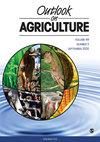Strengths and weaknesses of organized crop seed production by smallholder farmers: A five-country case study
IF 2.6
3区 经济学
Q1 AGRICULTURE, MULTIDISCIPLINARY
引用次数: 4
Abstract
In many countries, smallholder farmers play a key role in food crop seed production. So far, the community roles, operational structures, seed production efficiency, aspects of sustainability, and the social and policy environments in which these groups operate have been poorly studied and described. The present study attempts to better understand these factors by drawing cases from twenty-five seed producer groups in five countries (Vietnam, Uganda, Zambia, Niger, and Guatemala) that deal with nine crops in total (rice, maize, sorghum, pearl millet, common bean, cowpea, soybean, groundnut, potato and sweet potato). Results of the study show all groups supply a significant share of seed offered in local markets. It appeared that all groups received major support for capacity development from a broad range of actors including local and national governments, public institutions, national seed companies and development organizations. Several groups operate under seasonal contracts with institutional seed buyers, whereas other groups sell most of their seed in local markets to fellow farmers. To support seed quality and render product branding meaningful, most groups have established subgroups for crop monitoring and seed inspection, and for gathering and using market intelligence. Some, but not all groups depend on formal seed certification. Two key challenges stand out across seed producer groups interviewed. First, most seed producer groups experience difficulties in accessing good-quality early generation seed (EGS) on time, like in the formal seed sector in many countries. Second, in most groups packaging and labelling of the seed produced and offered in local markets is suboptimal, hindering further professionalization. Moreover, groups invariably have a poor understanding of applicable seed policy and legislation. Our observations point at actions that external stakeholders could undertake to strengthen smallholder farmer seed production in recognition of their contribution to food and nutrition security.小农有组织的作物种子生产的优势和劣势:一个五国案例研究
在许多国家,小农户在粮食作物种子生产中发挥着关键作用。到目前为止,对社区角色、运营结构、种子生产效率、可持续性方面以及这些群体运营的社会和政策环境的研究和描述很少。本研究试图通过从五个国家(越南、乌干达、赞比亚、尼日尔和危地马拉)的25个种子生产者群体中抽取案例来更好地了解这些因素,这些国家共有9种作物(水稻、玉米、高粱、珍珠小米、普通豆、豇豆、大豆、花生、土豆和红薯)。研究结果表明,所有群体在当地市场提供的种子中都占有很大份额。所有群体似乎都得到了包括地方和国家政府、公共机构、国家种子公司和发展组织在内的广泛行动者对能力发展的大力支持。一些集团与机构种子买家签订季节性合同,而其他集团则在当地市场将大部分种子出售给其他农民。为了支持种子质量并使产品品牌有意义,大多数团体都建立了作物监测和种子检查小组,以及收集和使用市场情报小组。有些群体(但并非所有群体)依赖于正式的种子认证。两个关键挑战在接受采访的种子生产商群体中脱颖而出。首先,与许多国家的正规种子部门一样,大多数种子生产商群体在按时获得优质早代种子方面都遇到了困难。其次,在大多数群体中,当地市场生产和提供的种子的包装和标签都不理想,阻碍了进一步的专业化。此外,各团体对适用的种子政策和立法的理解总是很差。我们的意见指出,外部利益攸关方可以采取行动,加强小农种子生产,以表彰他们对粮食和营养安全的贡献。
本文章由计算机程序翻译,如有差异,请以英文原文为准。
求助全文
约1分钟内获得全文
求助全文
来源期刊

Outlook on Agriculture
农林科学-农业综合
CiteScore
5.60
自引率
13.30%
发文量
38
审稿时长
>36 weeks
期刊介绍:
Outlook on Agriculture is a peer reviewed journal, published quarterly, which welcomes original research papers, research notes, invited reviews and commentary for an international and interdisciplinary readership. Special attention is paid to agricultural policy, international trade in the agricultural sector, strategic developments in food production, the links between agricultural systems and food security, the role of agriculture in social and economic development, agriculture in developing countries and environmental issues, including natural resources for agriculture and climate impacts.
 求助内容:
求助内容: 应助结果提醒方式:
应助结果提醒方式:


